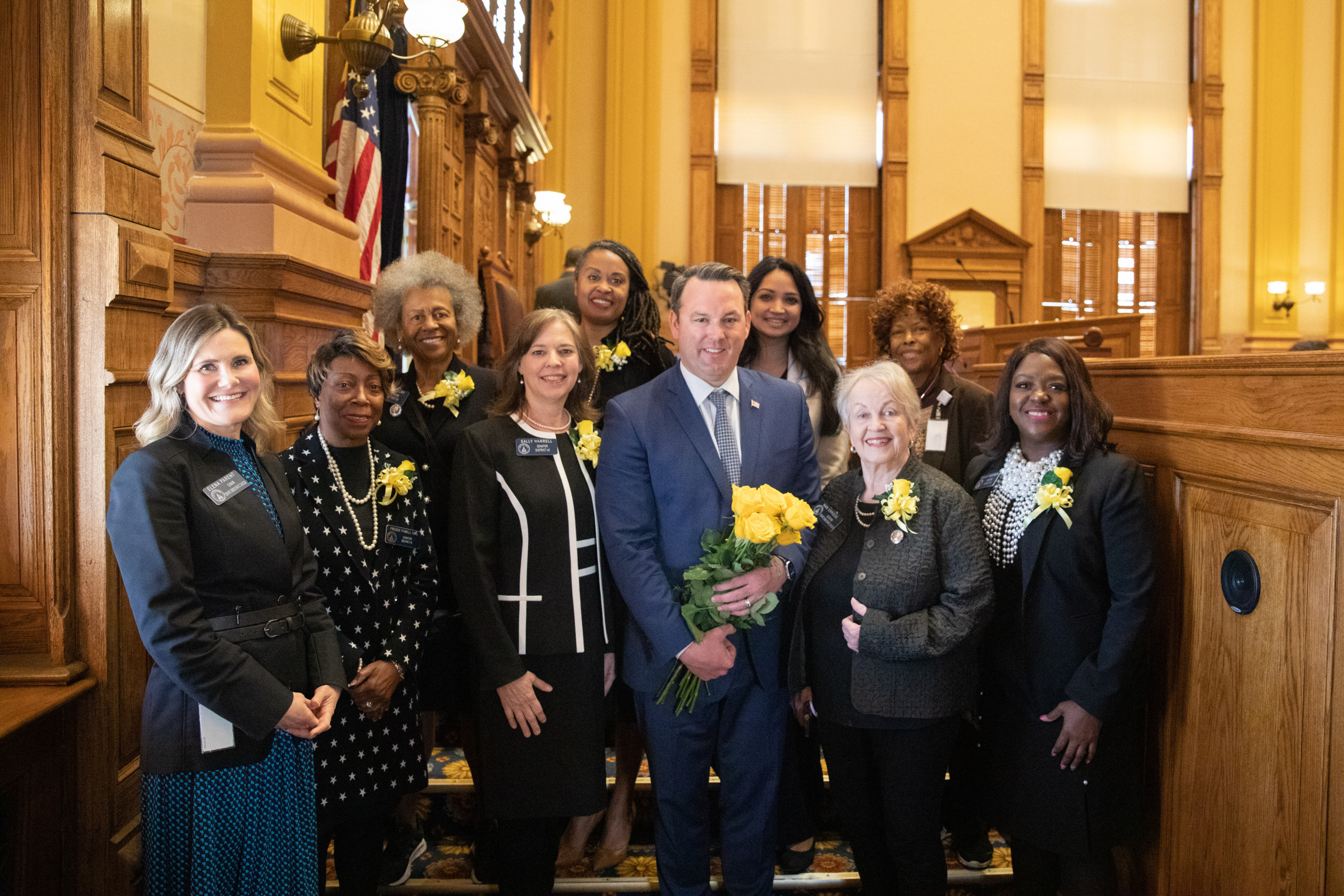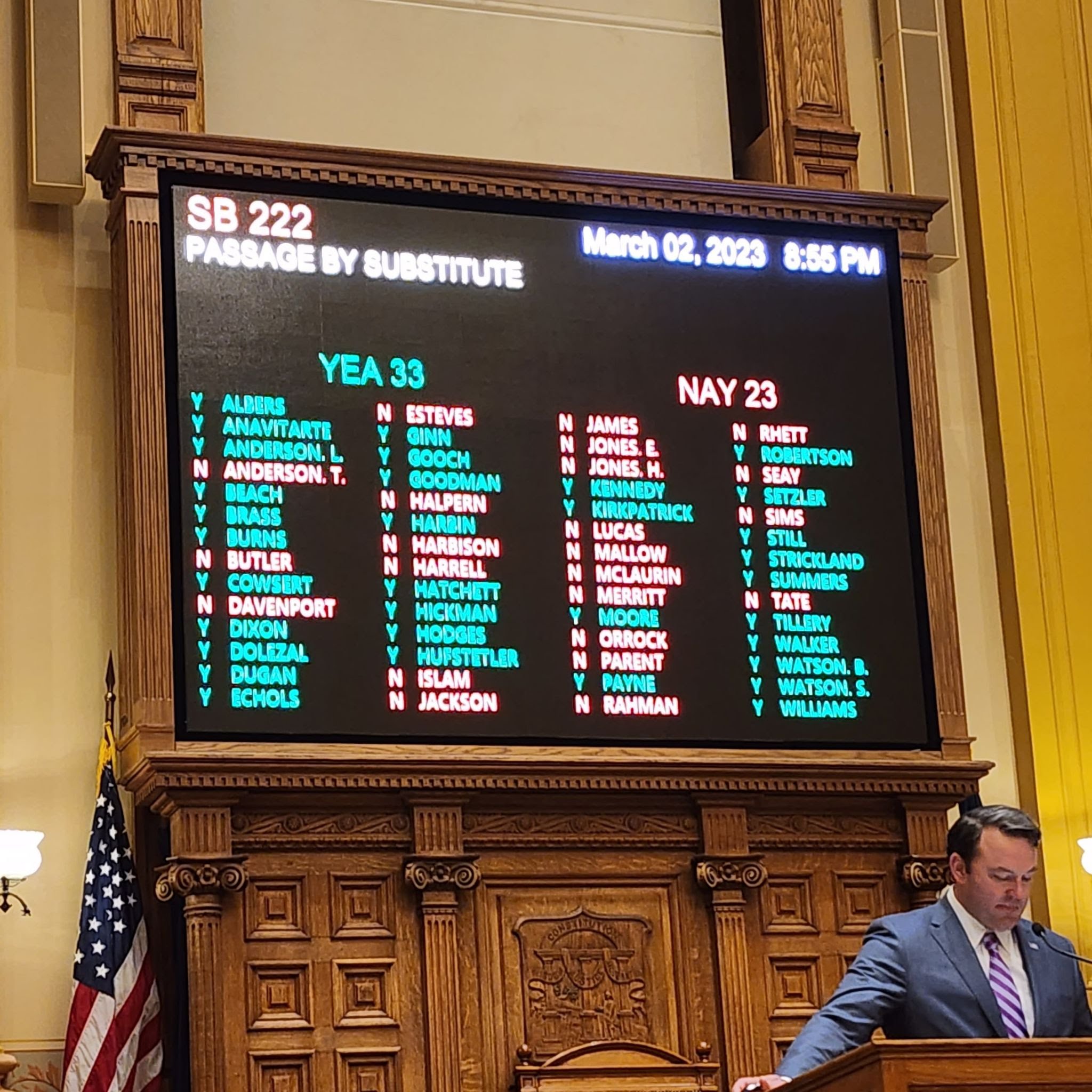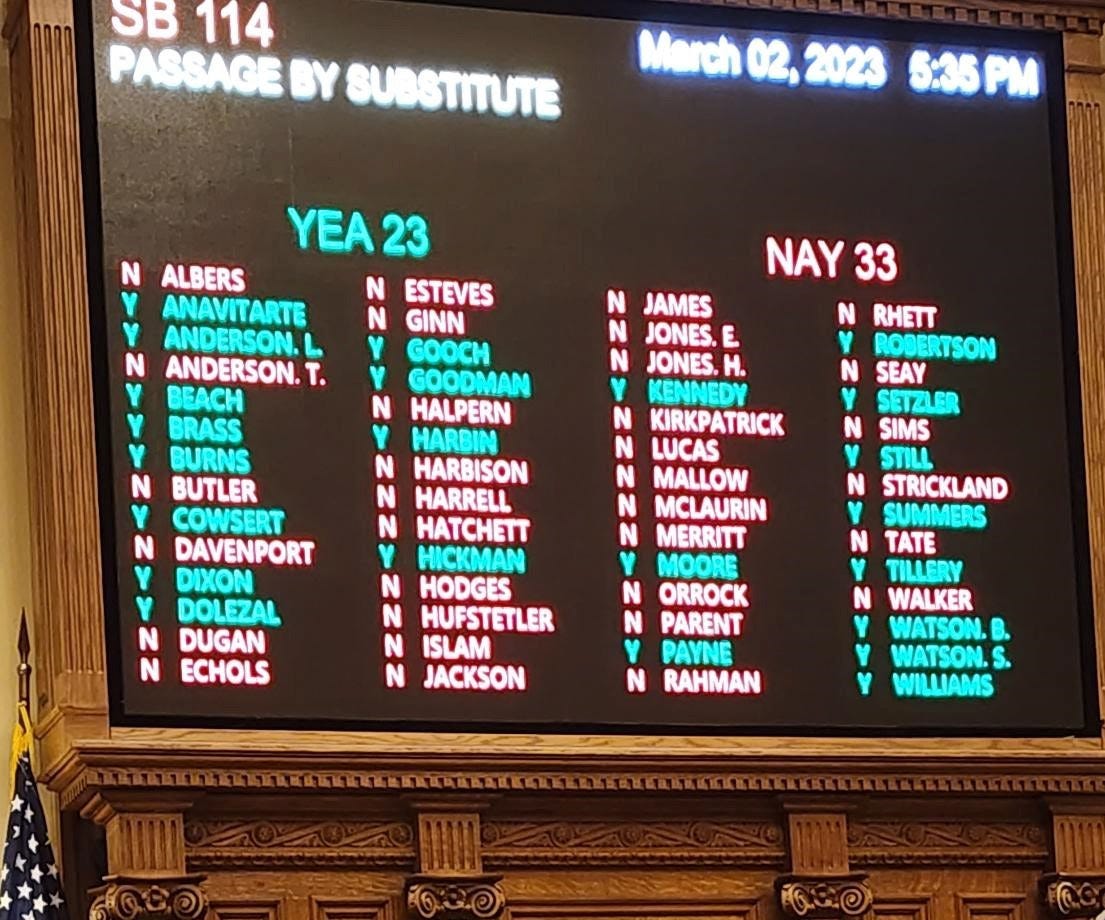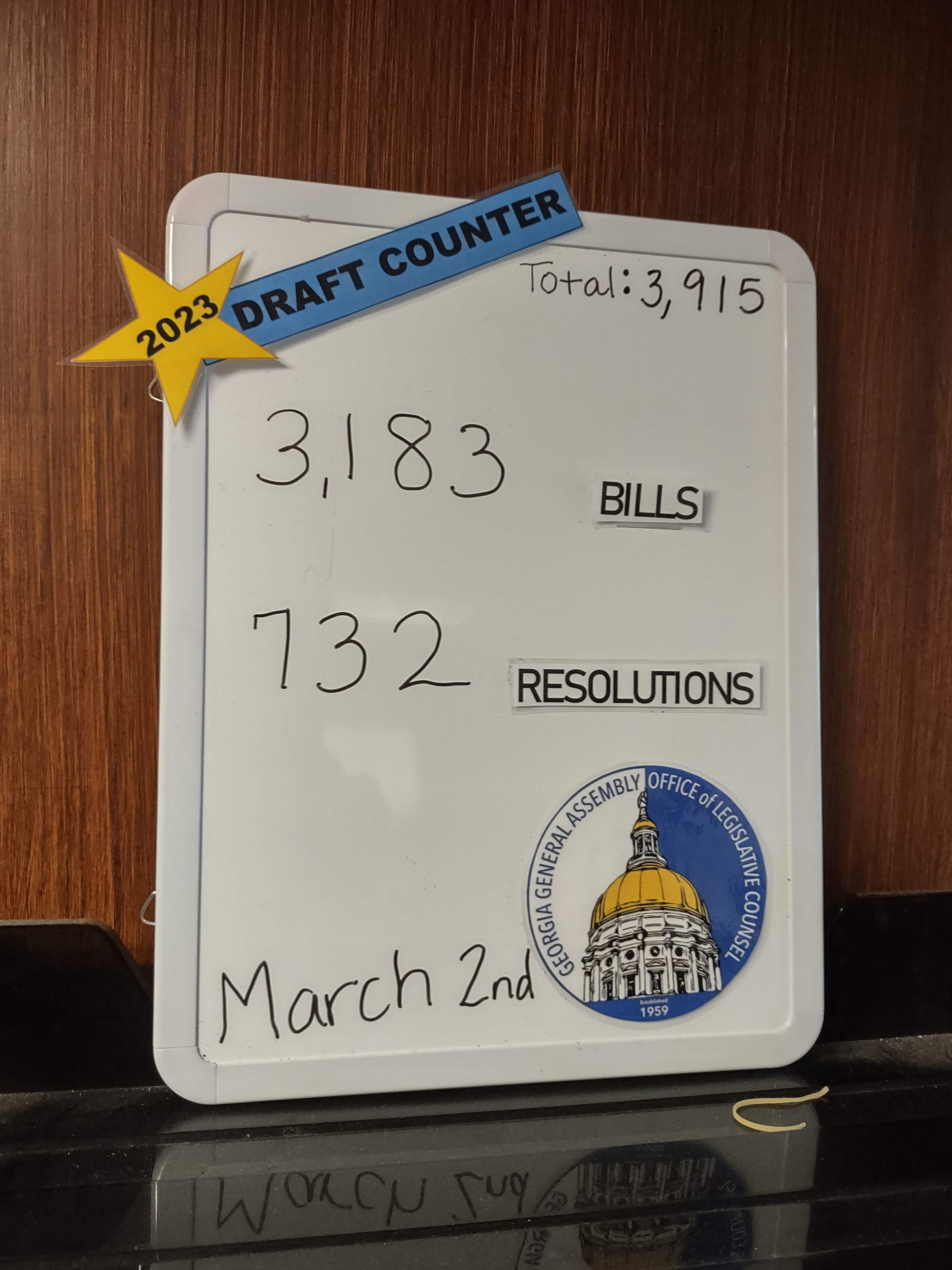Political Hijinks
“It’s that time at the Capitol when bills are flying so fast that
sometimes lawmakers don’t even know what’s in them.”
— Axios Atlanta
End of Session Escapades
Last year just before midnight on Sine Die, Republicans waived their own rules, forcing Senators to vote on a bill no one had laid eyes on — a situation deserving nothing but a “no” vote. The GOP majority voted “yes.”
Before Crossover Day, each chamber has 28 days to pass their own bills. Following Crossover Day, we only have 12 days to take up the other chamber’s bills, agree and disagree on changes made, form Conference Committees to work out the differences, and finally, vote on the final compromises.
I am grateful to my Senate Democratic Caucus teammates, who are smart, hardworking, and willing to speak out.
Avoiding Session Antics
I’ve been very cautious about filing bills this year because of the new Republican leadership. Every bill can potentially be used as a “vehicle,” carrying other bills as amendments — potentially turning the bill into something the author does not support — yikes!
That said, this week I decided it was worth filing two bills I’ve been working on. Note: bills filed this year carry over to next year.
Voter Eligibility Challenges: SB 321 increases the burden of proof for challenging the eligibility of voters. SB 202 (the big 2020 election bill) removed the cap on the number of challenges an individual can file. Since then, shenanigans have ensued, and the DeKalb County Elections office has been overwhelmed with unsubstantiated challenges. Dekalb officials estimate they’ve received more than 1,700 alone. SB 321 requires challengers to submit adequate evidence.
Non-Discrimination Protections: Senator Kim Jackson and I filed SB 319, adding sexual orientation and gender identity to Georgia’s list of protected classes. It also expands protections to housing, employment, and “public accommodations” which includes any service available to the public (think restaurants, retailers, hotels, public transportation, etc.). Georgia is one of only three states that do not have comprehensive non-discrimination laws. After fighting against bills targeting transgender youth, Sen. Jackson and I wanted to put our energy into something positive.
Transactional Tomfoolery
Early in the session, I was told that the new Republican leadership would be more “transactional.” While I wasn’t exactly sure what that meant at the time, it became painfully obvious this week. My attempt to pass a Task Force on Intellectual and Developmental Disabilities (IDD) as a rider to HB 520, a major mental health bill, got caught up in a battle with the Lt. Governor’s pet bill, SB 99.
SB 99 weakens the “Certificate of Need” (CON) process that requires hospitals to justify “need” before expanding services. CON stops for-profit companies from cherry-picking more profitable services, while leaving others to meet the need for less profitable services. Lt. Governor Jones claims SB 99 will help rural Georgia, but the truth is it will help fast-track a hospital project in his native Butts County, on land owned by a company his father owns.
Because House leaders and major health systems oppose SB 99, it’s being stopped by the House Health and Human Services (HHS) Committee. In retaliation, Jones is stopping HB 520, a much-needed next step in mental healthcare reform, in the Senate HHS Committee. My sources tell me this standoff won’t end before Sine Die, so Georgians likely won’t get mental healthcare reform or an IDD Task Force this year.
Funding Follies
The plot thickens (you really can’t make this stuff up). SB 99 and the Butts County hospital project have put the Lt. Governor at odds with Wellstar Health Systems. Wellstar opposes the proposed Butts County hospital because it threatens two of their hospitals in the area. Wellstar also happens to be involved in a partnership with the Augusta University Health System to upgrade electronic health records at the Medical College of Georgia. House leaders worry that SB 99 could jeopardize the Augusta project.
But in their quest to pass SB 99, Senate leadership slashed $105 million in University System funding in next year’s budget — the same amount that we approved in the mid-year budget for the Medical College of Georgia project. And they’ve stripped another bill of tax credits that would have benefitted Wellstar.
It’s been sad to watch this all play out. I miss the steady leadership of Speaker Ralston and former Lt. Governor Geoff Duncan. Duncan took a more hands-off approach, letting Senators lead instead of forcing his own personal agenda. There are good reasons I decided to be cautious with my bill filing this year!
It’s all Fun and Games until a Bill Gets Hijacked
Soap Box Derby becomes Sports Betting: Crunch time is when we see lots of bill hijacking. One freshman Republican House member learned this the hard way as her simple two-page bill to recognize her hometown Soap Box Derby was changed to a 45-page sports betting bill.
Anti-Semitism: After being tabled by the Senate Judiciary Committee, Senate leadership brought the anti-Semitism bill (previously HB 30) back to life by completely stripping the contents of HB 144 (a bill about guardianship) and substituting the language from HB 30. At issue is putting the International Holocaust Remembrance Alliance (IHRA) definition of anti-Semitism into Georgia code. The definition includes specific examples of anti-Semitism which proponents say will help law enforcement and other authorities better identify and hold people accountable for anti-Semitic acts. Opponents worry that the definition will squash anti-Israel speech, especially on college campuses. However, the IHRA definition explicitly says “criticism of Israel similar to that leveled against any other country cannot be regarded as anti-Semitic.”
My Budget Priorities Get a Boost
We ended the week by passing the Senate’s version of the “Big Budget” for FY 2024. It includes good things such as pay raises for teachers and law enforcement, cost of living adjustments for state retirees, and funds to help end the “hoteling” of foster kids.
I was relieved to see all of my budget priorities — $4 million for a technical school in Doraville (hopefully the Governor won’t veto this again), Medicaid coverage for Occupational Therapy Assistants, and 500 additional Medicaid Community Based Support waivers for people living with disabilities — included in the budget. I was especially proud when Appropriations Chairman Tillery gave me a special shout out as he presented the budget:
“And the line item that we were requested to add by the most Senate members in this budget was (funding for) 500 NOW/COMP waivers. And the credit for this again goes to the Senator from the 40th and the Senator from the 56th who have championed this cause in a bipartisan fashion and had numerous, numerous, members of this body sign on in support of their letters and I appreciate their approach and their support.”
Expect More Monkey Business
There are only two days left before Sine Die on Wednesday, which is still plenty of time for anything to happen. The budget is now in a Conference Committee where the House and Senate will work out their differences. Things can and do happen at the last minute, so keep your eyes peeled.
When bills are hard to pass due to excessive political hijinks, you can work the budget process to do good things. This year we continued the tradition we started last year of giving 500 more Georgia families access to Home & Community Based Services for their adult children living with intellectual & developmental disabilities.





